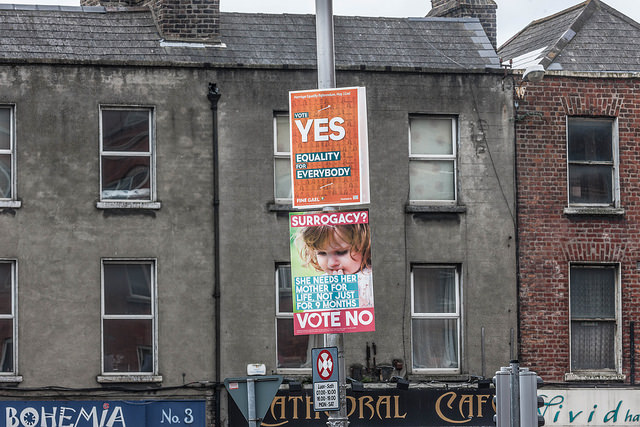
This Friday, May 22, Ireland will become the first country ever to hold a referendum on same-sex marriage. If passed, marriage equality will be enshrined in the constitution, extending civil marriage rights to same-sex couples only twenty-two years after homosexuality was decriminalized in the country. Earlier this week, Guernica spoke briefly to Irish author, journalist, and prominent LGBT rights activist Una Mullally about the significance of a Yes vote, her experience of being gay in Ireland, and the impetus behind her recent book, In the Name of Love: the Movement for Marriage Equality in Ireland.
“As a country that has experienced large and frequent cycles of emigration, many of Ireland’s gay people have made their lives elsewhere, in places where being gay was met with more tolerant attitudes”
Guernica: Can you tell us a bit about the history of gay rights in Ireland and the significance of this referendum to the country?
Una Mullally: Homosexual acts were only decriminalised in 1993, so Ireland is behind the times when it comes to LGBT rights. As a country that has experienced large and frequent cycles of emigration, many of Ireland’s gay people have made their lives elsewhere, in places where being gay was met with more tolerant attitudes. However, in the last decade or so, there have been significant strides made. Equality and employment legislation has, for the most part, protected people against discrimination on the grounds of sexual orientation (apart from in certain places, such as schools under the patronage of the Catholic church—which is still most Irish schools). In 2011 civil partnerships began to take place, offering gay and lesbian couples some legal protections and recognition of their relationships. In recent years, organizations such as BelongTo have done great work in schools to combat homophobic and transphobic bullying. The significance of this referendum is huge, not only for LGBT rights, but also for wider society in terms of people envisaging Ireland as a more progressive, inclusive and tolerant country than it has previously been perceived as.
Guernica: What are some of the more pervasive and/or potentially damaging misconceptions about this decision that you’ve encountered on the campaign trail?
Una Mullally: The No camp has spent much of the campaign trying to make the referendum about everything it is not, in particular by diverting the debate towards the unrelated area of surrogacy. The No campaign’s messaging has become hardened, which is obviously difficult for LGBT people to take, but it also ends up offending a much wider swath of people. Certain vocal factions within the No campaign have used the referendum as an excuse to voice homophobia and bigoted attitudes towards gay people.
“There is a lot of solidarity amongst the LGBT community. We are strong”
Guernica: What has your experience of being gay in Ireland been? What widespread attitudinal changes do you hope to see in the future?
Una Mullally: My experience of being gay in Ireland has been largely positive. Like most gay people I have encountered homophobia on the streets and have been physically attacked and verbally abused in the past. But there is a lot of solidarity amongst the LGBT community. We are strong. I’m looking forward to this referendum campaign being over, because it has been extraordinarily testing having your life and identity debated, and having to ask the wider public for your equality. If a Yes vote is carried, I think it will have a profound impact on LGBT lives. All young people will be able to grow up with similar aspirations regardless of their sexuality. Same-sex parents raising children will have their families protected under the constitution. And in terms of bigger picture stuff, I think it will give LGBT people more confidence, more opportunity to be open about their lives and less fearful. I think it will create a better and fairer society.
Guernica: You’ve been an outspoken advocate for LGBT rights in Ireland and abroad for years. What prompted the decision to chronicle the evolution of the movement in your recent book?
Una Mullally: It was the right time because we knew a referendum was in the cards. Also, history can get forgotten or claimed in various ways once a movement has achieved its goal, so I thought it was important to document it while it was still live. The format of an oral history appealed to me because I think it’s a more democratic approach, and it also allows for people’s conflicting memories from which readers can extract their own truths.
“I think Ireland wants to be seen for what it really is—generous, tolerant, and welcoming”
Guernica: What impact, if any, do you see the outcome of this referendum having beyond Ireland?
Una Mullally: I think it’s hugely significant in a global context because Ireland could become the first country in the world to pass marriage equality by a national popular vote. I do feel that the perception of Ireland globally is still that of a small, conservative, Catholic country. That’s not the reality (apart from the “small” bit), and I think Ireland wants to be seen for what it really is—generous, tolerant, and welcoming. For other nations currently trying to progress marriage equality rights, I think Ireland could be a good case study, not just for eventual outcomes, but also for how campaigns like this are run and how hearts and minds were won.

